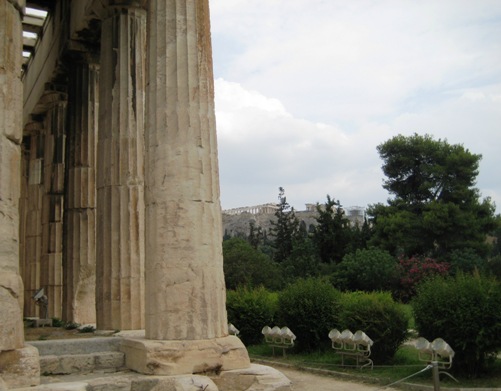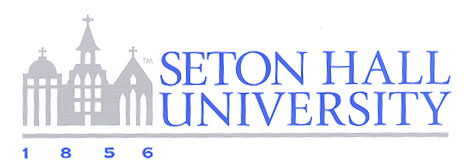8/28
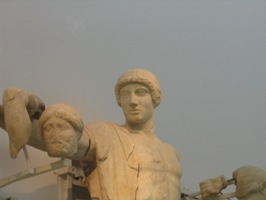
Apollo, from the west front of the Temple of Zeus, Olympia |
Welcome to
the Honors Program for both CORE 1101 and HONS 1001
Introduction to the course: The Symposium. What does it mean to be a
learner? a thinker? a critical reader? Indeed, what do you hope or
expect to get out of your university education? For this introduction,
we will first meet in our CORE sections to get to know each other; then
we will all meet in the HONS section. We will begin our semester
together with a discussion of Plato’s Symposium; be sure you come to
class having read it, and indeed discussed it with your classmates. In
today's class we will be exploring ways in which we can best learn from
each other by listening carefully to each other and by looking carefully
at what's before us.
Writing assignment, due at the next class: Please
read and review the syllabus carefully, paying particular attention to
the course description above, and to the course objectives and
requirements below. Reflecting on these statements, introduce yourself
to us as a learner. How best do you learn? What do you anticipate being
a challenge for you? In what ways would you like to improve? Write us a
one-page letter and post it on the Discussion Board for the Colloquium
in Blackboard.
|
8/30
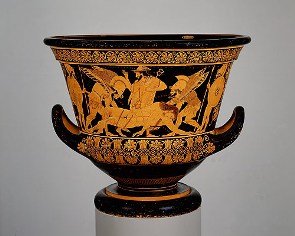
Krater showing Sarpedon carried away by Sleep, Death and Hermes, signed
by Euxitheos the potter and Euphronios the painter c. 515 BCE
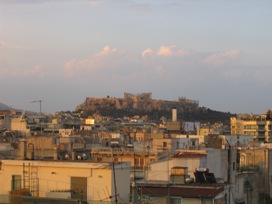
Acropolis at sunrise |
Plato's Symposium
Before you read: imagine yourself at a late night party with some close
friends. You begin talking about love. You find that each of you speaks
about love in a different way. Jot down some notes about what you would
say about love.
After you read: Consider both the structure and content of the reading.
Come to class prepared to discuss the following questions, and
post some thoughts on them in your first Journal
entry in the Blackboard Journey course:
Structure: The characters in the Symposium are exploring a weighty topic
together. How did they interact with one another? Is the ”symposium” an
effective means of education? Why or why not? Is this a real
conversation, or is it just a literary device of Plato's?
Content: Which of the speeches was most different
from your own imagined discussion regarding love? How was it different?
Which one was closest? In what way?
There are three main goals of the journal
assignment.
1. To provide opportunity for reflection and integration of the course
material at a personal level.
2. To provide a place to practice and improve your writing skills.
3. To have regular contact with the professor regarding your thoughts
and ideas about what you are learning.
It is up to you to decide on what you want to write about for each
entry. However, you must choose to discuss something related to the
course. This means you can reflect on what you are learning from reading
the assigned text, or from class discussion, or from your discussing the
text with your classmates. Whatever you choose, we should be able to
tell that you are taking the course when we read your journal entry.
Also, work hard to avoid simply summarizing the reading. You can do that
in your reading notes. The point of the journal is to think about the
material and to let us know what you're thinking. What are you learning?
We often suggest some questions in the syllabus; these questions are not
necessarily the ones we want you to answer in your journal, but are
suggestions as to what kind of questions you want to work with. What
questions occur to you, and what insights have you gained through
engagement with the course material? This is also the place that you can
consider the implications of what you are reading/learning, and ways
that these texts might intersect with your own life and community.
We expect you to write as cogently as possible in your journals. Of
course, we expect you to write in formal English, with complete
sentences; this is not a text message. We also expect to see improvement
in your critical thinking and writing skills over the course of the
semester reflected in your journals. We will provide regular feedback
including suggestions on ways to improve. Please read this feedback and
use it to strengthen your work.
You should write your
journal entries in Word and then cut and paste them into the Journey
Blackboard site. Do this by clicking on the button marked Journal that
is listed on the left of the Blackboard site for our course. After
clicking on Journal, click on the Create Journal Entry for the
appropriate date and paste your work into the window. Please don't
"attach" it to the entry. Be sure you are posting for the right date!
Read before class:

In the Honors class we will continue this discussion of the Symposium.
Do the various speakers in the text learn from each other? What do you
make of Aristophanes' account of the nature of love? What is he really
describing? What do you make of Socrates' speech? Remember, they are all
speaking of eros, which does mean "love" in the sense in which we use
it, but also means "desire." We will see various understandings of this
idea through the semester; what do you make of Socrates' account? Is is
about "love" or "desire"? Is there a difference? Socrates' speech is one
of the seminal texts in the history of thought, and we will see these
ideas time and again; what do you make of it?
You might want to take a look at
this version of
Aristophanes' speech.
First writing assignment due.
|
9/4
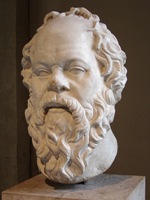
Socrates The Louvre
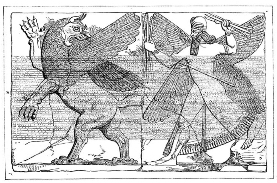
Marduk and Tiamat
|
Continued discussion of Plato's
Symposium
What do the various characters in the discussion have to say about what
it means to be human? Is desire essential to their understanding of
human experience? Is "love" in our sense essential to their
understanding? What is the basis of my relating to others? Does
love/desire bring me outside myself? Is that a good thing? Why? How do
we develop human community on this basis? What do you make of the
"platonic ascent" from seeing beautiful things and persons to
contemplating Beauty Itself? Do you recognize this ascent from other
contexts?
What to you is the most valuable insight you have had from thinking
about the Symposium?
Foundation Stories: Who are we and where do we come
from?
Several of the speeches in the Symposium account for love in the form of
a foundation myth; certainly Aristophanes' speech does so. How do other
foundation stories similarly seek to interpret human existence as they
know it? We will look at several such accounts.
What physical picture of the world do you imagine based on the meaning
of the names of the gods at the beginning of the creation epic?
How does the young gods' behavior affect Tiamat, Apsu and Mummu? What do
each of them think about the problem?
Consider the family relationships in Enuma Elish. Why is the discord
such an important element in the story? What do these relationships tell
us about the culture of the myth keeper?
Who alone will face Tiamat? Why does he think he can defeat her? What
does this tell you about Mesopotamian culture? What do you think the
defeat of Tiamat might mean?
Why do you suppose the gods are depicted as getting drunk when they make
the decision to give Marduk supreme power?
Of what were humans made? Why? What about in the Atrahasis? How and why
were humans made in this text?
Compare the type of god used to make human beings in the Enuma Elish
with the kind of god used in Atrahasis. Do we get a different view of
the relationship between human beings and gods?
Why do you think the city of Babylon was created right after human kind?
What does that tell you about Babylon?
Read before class:
- Heritage of
World Civilizations, pp. 4-28 (1-23 in the 9th edition)
- Atrahasis,
Myths from Mesopotamia, pp. 1-38
- Enuma Elish (The Epic of
Creation), Myths from Mesopotamia, pp.
233-277
First essay assignment: Choose one of
the origins stories we are studying, other than the texts from Genesis.
What does this story tell the ancient audience about the world? How
should the listener live in the world as a result of this knowledge?
Formulate a clear thesis, and support your argument with textual
evidence. This paper should be about three pages in length. Click on
this link for our guidelines on how your papers are to be graded. This
assignment is due on September 20.
|
9/6
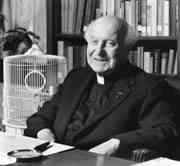
Monsignor John M. Oesterreicher
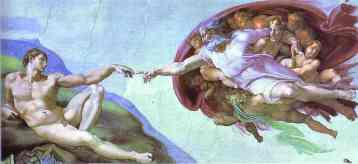
The Creation of Adam
Michelangelo, The Sistine Chapel |
Setting the questions: The Second
Vatican Council's decree ”Nostra Aetate”
This groundbreaking document from the fourth session of the Second
Vatican Council in 1965 represents a dramatic reformulation of the
Catholic Church's understanding of other religious traditions. Its
section on the Church and the Jewish people was largely drafted by Seton
Hall professor Monsignor John M. Oesterreicher.
The questions of meaning that this document raises in its first section
are the central themes of this course as well: what does it mean to be
human? What is the meaning and purpose of life? As you read it, reflect
on your own religious and cultural understanding of the "others",
whoever they may be. To what extent do you think this document sets an
agenda for finding common ground with others? To what extent do you see
it as problematic? Why? How much of it strikes you as "news"?
Before you come to class, write a paragraph
or two in your Journal, giving your first answers to some of these
questions. After class, go back to your Journal and add a paragraph or
two on how your thinking has changed as a result of our discussion.
Read before class:

Foundation Stories
Who are we and where do we come from? What do these stories tell us
about the self-understandings of the people who told these stories, and
of those who collected them? What do they say one should do? What do
they say it means to be human? How should society be organized? Why?
Genesis 1-11 is a collection of stories that biblical scholars have
named “the primeval history” because they are stories about ancient
origins. Note that this part of the Bible is not called “primeval”
because it is the oldest part of the Bible. In fact, most scholars think
that this collection of stories did not come together in its current
state until after the Babylonian exile of the Judeans, perhaps in the
5th or even 4th century BCE. To be sure, the material here draws on
earlier versions of some of these stories. For instance, the story of
Adam and Eve in the garden may have been told in the 10th century BCE.
On the other hand, the seven day creation account of Gen 1:1-2:4a likely
dates to a later period. This means when we read Gen 1-11, rather than
thinking of it as a straightforward account of the origins of the
universe, we should consider what the storytellers and the later
compilers of this material wanted to say about the nature of the world,
of humankind, of the God/human relationship, and so on.
Read before class:
- Heritage of
World Civilizations, pp. 64-68 (56-61 9th ed.)
- Genesis 1-11
- Hesiod selections (in Course
Documents on Blackboard)
|
9/11
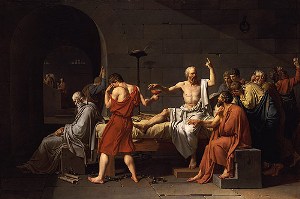
The Death of Socrates, by Jacques-Louis
David
Metropolitan Museum of Art
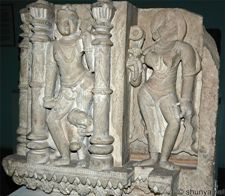
Indra and Agni, 10th century Indian
Surwaya, Madhya Pradesh
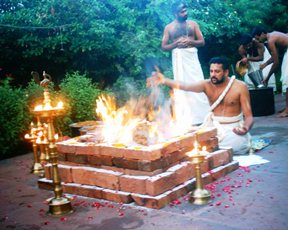
Yajna fire ritual to Agni

Galaxy Cluster Abell 370, photographed by the Hubble telescope.
Notice the light bent by the curvature of space-time. |
Socrates' Apology
Socrates (469-399 B.C.E.) was Plato's teacher. In the course of great
civil unrest in the years following Athens' defeat in the Peloponnesian
War, he was brought to trial on charges of introducing foreign gods and
of leading the youth of Athens astray. The Apology was apparently
composed not long after Socrates' death; it presents itself as Socrates'
defense against the charges levied against him, and his speech to the
jury after he was found guilty. (The "apologia" is the formal reply to
charges, the speech for the defense; it's not an "apology" in the modern
sense of expressing regret for wrongdoing.) He was sentenced by the jury
to execution. The text indicates that Plato was present at the trial;
other dialogues suggest that Plato himself was also present at Socrates'
death. The issues of truth and justice that the death of Socrates posed
remained central issues in Plato's thought.
Do you think Socrates was "wise"? Why? What might "wisdom" be? What
passages in his speech strike you as particularly noteworthy? What's
there that surprises you? Why? Socrates says (38a) that "the unexamined
life is not worth living for men." Do you agree with him? Why or why
not? What if he is right? What do you think of his reaction to his
impending death? Why? What do you make of Socrates' final comment? How
does Socrates know what he knows? Can you know that way? Should you?
What should you do? How can you get to the transcendently true? How do
you know? What can we learn from Socrates' search for truth?
Before you come to class, write two or three
paragraphs in your Journal in Blackboard with your first reflections on
today's reading.
Read before class
- Plato's
Apology, Crito (The Last Days of
Socrates)
Recommended additional reading:

Foundation Stories: Vedic Ritual and Epic Knowledge
Who are we and where do we come from? The Rig Veda was composed
somewhere between 1700 B.C.E. and 1100 B.C.E.; it consists of a number
of hymns which were recited as part of rituals for centuries before they took
written form, probably in late antiquity. The Rig Veda gives us insight
into ancient Indian thought about the nature of human life and of human
society; it also stands as a foundation of later Indian thought on these
and many other topics. We might ask: who am "I" in the Vedic texts? What
does one do? What is the goal? Does the Rig Veda give a different
understanding of the world than the other texts we have been reading?
How? In what way is it different? What is the place of Agni, the
god of fire and fire sacrifice? of Varuna, the god of water, sky
and law? What does Purusha say about your place in the universe? How does the Rig Veda's world look
different from yours? How is it similar? What is the nature of the
similarities you see?
Outside of the Vedic textual traditions, other streams of stories and
myths were circulating and developing in India from the late first
millennium, BCE into the late millennium, CE. These collections
incorporated folk traditions, local histories, and new cults focused on
minor gods from the earlier Vedic corpus, particularly the god Vishnu.
These traditions were compiled in the great epic poems of India, the
Mahabharata and the Ramayana. In these massive collections, new ideas
rubbed shoulders with classic Vedic ideals, and their stories would in
turn become the feeder stories for the next generation of Hindu texts,
the Puranas (c. 300 to 1000 CE).
A good example of this is this excerpt from the Mahabharata (Book 3,
"Vana Parva", section 189). The story is set within the overall
narrative of the period of the virtuous Pandava brothers’ exile in the
forest for 13 years (and before the actual war that occasions the
Bhagavad Gita). There, their righteous submission to the austerity of
such exile, as well as their heroic bearing in general, wins for them a
visit from the great sage Markandeya, who is celebrated for his
encyclopedic knowledge and wisdom. They ask him many questions about the
origin of the world, the nature of reality, and the essentials of
upright behavior. Here, they ask for a description of the current world
age, the fourth of four that are part of the eternal cycle of creation
and dissolution of all things in Vishnu, the supreme being, who gave
this revelation to the sage. Note the cosmic pessimism about the future
of this age, when all things will devolve into "mleccha", which is
basically undifferentiated scum.
What are the characteristics of the four ages (yugas) and how are they
related? What is the real crisis of the Kali Yuga, according to
Markendeya? How does it relate to the Vedic tradition? How does the
Indian understanding of time as endlessly cyclical, with neither
absolute beginning nor absolute end, change your understanding of these
texts ?
Read before class:
Part of this class will be devoted to
the formulation of a good thesis statement. Come to class with the
thesis you are planning to use for your next paper, so that you can get
feedback on your thesis before you begin writing. The "Miniature Guide
to Critical Thinking" may help you work your way towards a thesis on the
text you have chosen. You are encouraged to critique each other's papers
while you are still writing. If you are having problems, consult one of
your professors, or go to the Writing Center.
|
9/13
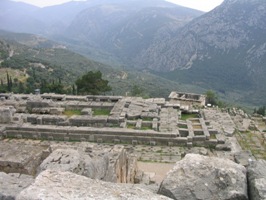
The Temple of Apollo at Delphi; the Oracle
was inside the temple.
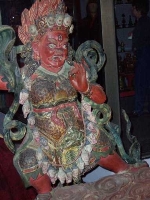
Yama, the Lord of Death |
Further discussion
of questions raised by Plato in the Apology and the Crito
How does Socrates know what he knows? Can you know in that way? Do you
see yourself as a "self" in the same way as Socrates did? Should you?
What does it mean to be an educated person? Can you separate job skills
from yourself? Is it enough to become a "professional"? How can your
education contribute to the non-professional part of your future? What
will you do with the rest of your life?
How can we construct a just society? What makes society just? What do
these two texts say about the citizen's responsibility to the law? about
your responsibility to yourself?
Read before class:
- Plato's Apology,
Crito (The Last Days of Socrates)
- Aristophanes, The Clouds

Foundation Stories: The Upanishads
The Upanishads as texts were conceived and preserved within the main
Vedic schools, but represent a philosophical shift away from the strict
ritualism of sacrifice of the classic Vedic tradition. Although many
Upanishads are indeed ancient, the Katha Upanishad is now held to be mid
to late 1st millenium BCE, dating from somewhere between 500 and 200
B.C.E. It gives us a different ancient Indian thought about the nature
of human life and of human society. What do "I" learn from death in the
Katha Upanishad? What does one do? What is the goal? What is the nature
of the self, of the "I" that this text propounds? How does it differ
from other understandings of the self that we have already seen?
Read before class:
|
9/18
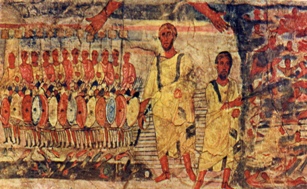
Moses and the Red Sea
3rd century fresco, Synagogue, Dura Europos
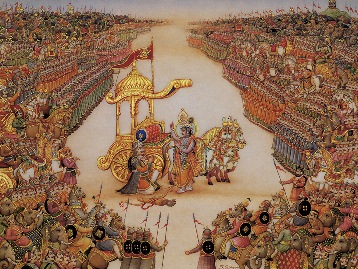
Krishna and Arjuna |
Foundation Stories:
Exodus
The Book of Exodus contains the stories that
constitute the foundation myth of the Hebrew people, comparable in
intent to the American stories of the Revolution. They tell of events
which can probably be dated to the mid-13th century B.C.E., but whose
meaning is to be found in the ongoing life of the people. They have
their origins in oral storytelling, and probably did not take written
form until about the 6th century B.C.E.
What do these stories teach about what it means to be "us"? What picture
of the divine do they convey? How do they present themselves as guides
to the ongoing life of the community?
Read before class:
- Exodus, chapters 1-15; 19-24
Before you come to class, write two or
three paragraphs in your Journal in Blackboard with your first
reflections on today's reading.

Heroes and Models: The
Bhagavad Gita: How does one act? What basis does one have for choosing a
way of action?
What is this story about? What do you find most surprising about it?
What do you find hardest to understand? What do you find surprisingly
familiar? Why? What does the storyteller want you to do? to think? What
does Krishna say the self is? Why is self-understanding important? How
does one get there? What in Krishna's teaching do you find agreeable?
What of it do you find difficult? How does Krishna's teaching differ
from others we have seen? How is it similar? How does it critique the
worldview of the Vedas and the Katha Upanishad?
Read before class:
|
9/20
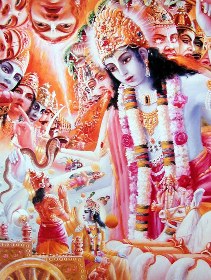
Krishna revealing himself to Arjuna |
The Bhagavad Gita:
How does one act? What basis does one have for choosing a way of action?
Discussion continued
How does Krishna reveal what he himself is? What does Krishna say the
self is? How does that understanding of the self serve as a basis of
action? Why is self-understanding important? How does one get there?
What in Krishna's teaching do you find agreeable? What of it do you find
difficult? How does Krishna's teaching differ from others we have seen?
How is it similar? How does it critique the worldview of the Vedas and
the Katha Upanishad? How does it respond to the worldview espoused by
the Buddha? How does the Gita understand That Which is Ultimate? What
consequences does it suggest that follow from that understanding?
We will spend the entire morning in discussion of this key text.
Before you come to class, write a few
paragraphs in your Journal with your reflections on the Gita.
Read before class:
First essay due. Bring two paper copies
to class.
|
9/25
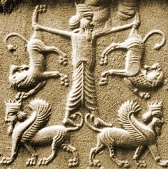
Gilgamesh
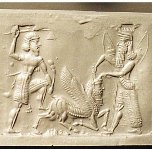
Gilgamesh and Enkidu killing the Bull of
Heaven |
Heroes and Models:
Gilgamesh
Gilgamesh is the protagonist of a number of ancient Mesopotamian stories
which appear to have been widespread in the ancient Near East. What does
the story say about the difference between civilization and the wild?
What is the natural world? What is the importance of friendship in the
story? What do you make of Gilgamesh's reaction to the death of Enkidu?
What do you make of the flood story? What does "immortality" mean?
Read before class:
- The Epic of Gilgamesh,
Myths from Mesopotamia, pp. 39-125

Ancient Heroes and Anti-heroes: The Iliad
Gilgamesh and Achilles raise the question of what it means to be a
"hero." In what sense do they represent a cultural ideal? What kind of
ideal do they represent? Are they meant to be imitated? revered? Why?
Read before class:
- Heritage of
World Civilizations, pp. 86-94 (74-87 9th ed.)
- The Epic of Gilgamesh,
Myths from Mesopotamia, pp. 39-125
- The
Essential Iliad, Books 1-3, 6
|
9/27
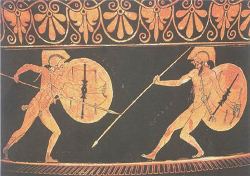
Achilles fighting Hektor Attic vase, c. 490 B.C.E.
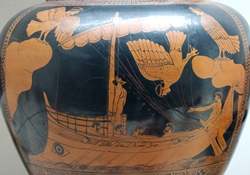
Odysseus and the Sirens
Attic red-figure stamnos, c. 480 B.C.E. |
Heroes and Models: The Iliad
Who is the hero? What is a hero? Is the hero an "I"? In what sense is
Achilles the hero of the Iliad? Is Achilles responsible for his wrath?
Who are the gods in the story? Why does the poem begin with Achilles'
wrath, but conclude with Hektor's funeral rites? What in this poem made
it the story all Greeks knew and remembered? What part of the poem do
you find most compelling? Why?
Read before class:
- The
Essential Iliad, Books 9, 14, 16, 18-24

Heroes and Models: The
Odyssey
What in this poem made it so precious to the Greeks? What made Odysseus
such a culture hero? What does that tell us about the people who
treasured this poem? What values does it convey, and how?
Read before class:
- The
Essential Odyssey, Books 1-13
|
10/2
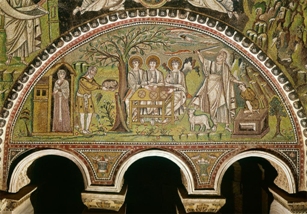
The story of Abraham 6th century San
Vitale, Ravenna
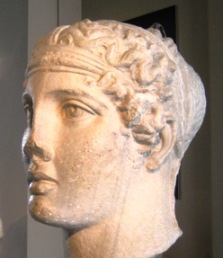
Sappho 1st century Roman
National Archaeological Museum, Istanbul |
Heroes and Models:
Abraham and Ruth
The story of Abraham is another ancient origins story; Abraham is in the
Hebrew, Christian and Muslim traditions the archetypal figure of the
obedient servant of God. His journey of faith is presented as a model
for believers to follow, in all three traditions. Ruth is similarly
presented as a model woman. A non-Hebrew, she nevertheless chooses to
remain with her late husband's family and people, and so becomes an
ancestor of King David.
What lessons are meant to be drawn from the stories of these two people?
Read before class:
- The Story of Abraham, Genesis
12-25
- Ruth, chapters 1-4

Heroes and Models: The Self and the Polis
Read before class:
- Odyssey,
Books 16-24
- Greek lyric poetry (in Blackboard)
- Heritage of
World Civilizations, pp. 94-101 (87-91 9th ed.)
We will also be beginning your
preparation for our midterm exam. Go to the class site on
Blackboard and find "Midterm Exam Material" on the menu. In that
wiki, post names, places, things, ideas, themes from the first half of
the Colloquium (the big class section) . We will refine that list
in the class of October 2, and begin developing essay questions for the
exam. Come to class with potential essay questions in mind.
Second essay assignment: close reading
and analysis of a text. Choose one of the following texts and analyze
the main themes in this text, paying attention to the context, language,
tone, voice, metaphors, meaning contained in it. Out of this analysis,
develop and argue a thesis about the meaning of one of these themes.
This paper should also be about three pages in length; you are
encouraged to critique each other's writing before handing it in. This
assignment is due on October 25.
- Iliad, Bk.
9, lines 415-441
- Bhagavad Gita, Chapter 11, stanzas 19-23
- Epic of Gilgamesh,
Tablet I, iv (pp. 55-56)
|
10/4
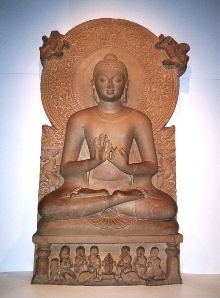
Buddha Sarnath Deer Park
4th century C.E.
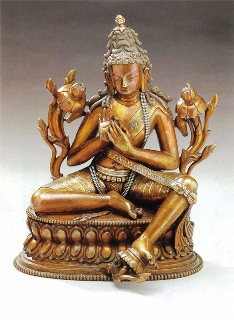
Avalokiteshvara 13th century Tibetan
The Newark Museum |
The Buddha and Buddhist teachings
Siddhartha Gautama (traditionally 566 - 486 B.C.E., although some modern
scholars date him about a century later) is known to us as the Buddha,
the Awake One. At his enlightenment at the age of 35, he came to
understand what he taught as the Four Noble Truths: that all life is
suffering (dukkha), that the cause of suffering is desire, that suffering can be
ended, and that the way to end suffering is the Noble Eightfold Path:
right understanding, right thought, right speech, right action, right
livelihood, right effort, right mindfulness, and right meditation. This
"Middle Way", between bodily indulgence and harsh physical asceticism,
focuses on the concentration of the mind to a proper understanding of
reality. He spent the rest of his life teaching this dharma (truth,
teaching, thing); his teachings were collected orally after his death,
and much later reduced to writing. During his lifetime, he gathered
thousands of followers, who adopted his mendicant style of living; these
bhikkus (monks) were his first sangha, or community.
The three texts for this class purport to represent the actual teaching
of the historical Buddha, who was roughly a contemporary of Socrates.
"Buddha" means literally "awake"; these teachings explain how life looks
when you are truly awake to the real.
What in these texts do you find challenging? What is utterly unfamiliar
to you? What are you comfortable with? How do these texts differ from
your own understanding? Why? What do these texts want you to think? to
do? How do they accomplish this? What do they take for granted that you
do not? What difference does this make in your ability to grasp them?
Who are "you" in these texts? How should you act? Why? How are the
Buddha's answers similar to those we have seen? In what ways is the
Buddha critiquing earlier Indian ideas, such as we have already seen?
How are they different? What does suffering mean? How does one find
meaning in it? What is freedom? What is important in life? In what ways
is the Buddha's teaching a critique of social norms? How does his
teaching challenge your own self-understanding? Why?
Before you come to class, write a few paragraphs
in your Journal with your first reflections on today's reading.
Read before class:

The Buddha and Buddhist teachings: The Heart Sutra
About the beginning of the Common Era, the monastic form of Buddhist
teaching was challenged by an interpretation of the Buddha's teaching
which focused on the availability of the Buddha and his teaching to the
larger community, and not only to those who adopted the monastic life.
This "greater vehicle," the Mahayana, also developed the ideal of the
bodhisattva, the enlightened being who postpones his own entry into
nirvana for the sake of the enlightenment of all sentient beings. In
this light, the Buddha is a permanent presence, and enlightenment is a
possibility for all who seek to uncover their own buddha nature. It is,
by and large, the Mahayana form of Buddhism which moved into China,
Korea and Japan. A further expansion of the Mahayana, the Vajrayana, or
"Diamond Way," became the basic form of Buddhism in Tibet. The Mahayana
text for this class explores the subtler metaphysics and ethics of this
branch of Buddhist thinking.
The Heart Sutra is a rather later Buddhist composition, dating from
somewhere in the early centuries of the Common Era, perhaps as early as
100 C.E. Notice that in this text the Buddha is not the speaker, but is
a silent presence approving what is said. The speaker is Avalokiteshvara
(Chenrezig in Tibetan), a disciple of the Buddha who emerges in later
Buddhist thought as the boddhisattva (the person who perfectly realizes
an ideal) of infinite compassion. It is important in reading this text
to note who the speaker is: what is taught in this text is the
foundation of compassion.
What do you find most compelling in this text? What is most unfamiliar?
How is it like other texts we have seen? How is it different? What does
the text take for granted? Note that the text explains that all aspects
and objects of human knowing are "emptiness" (shunyata): form, feeling,
cognition, conception and consciousness (the five "skandhas" or "heaps") are all equally empty, and that
their emptiness is not other than what they are. How does that shape
what it says? What does the text say about the meaning of the universe?
about the meaning of life? about you? How does its understanding of the
nature of reality shape its ethical teaching? What does this text have
to say about the meaning of the individual? about how you should act?
about why you should act? What is freedom? How does one find meaning in
suffering? How does one find the transcendent in one's life? What is
true human community? How does compassion emerge as a consequence of
this teaching?
Read before class:
If you are really ambitious, you can
tackle Nagarjuna's (c. 150-250 C.E.) analysis of these ideas in his
Exposition of the Enlightened Mind (Bodhichittavivarana).
The essence of his argument is spelled out in his
Sixty Verses
(Yuktishastika): since all things arise dependently, out of causes and
conditions, everything, even nirvana, is ultimately devoid of reality.
"Shunyata" is the noun form of "shunya", "empty", which is the word
Indian mathematicians used to form the concept of the "zero"; note that
Greek and Roman mathematics does not have the concept of zero, which
came into the West through the Arabic translations of Indian
mathematical texts in the 9th century and the Latin translations of
those texts in the 12th. Nagarjuna argues that "emptiness" is not
the same as nihilism, since nihilism must posit that nothingness is
real: a real destruction would require a real thing to be destroyed, and
a real subject to observe it. Neither is the case.
You may find helpful the images and
explanations at
this site, as well as the linked page
here.
|
| 10/9 |
Fall Break - No Classes |
10/11
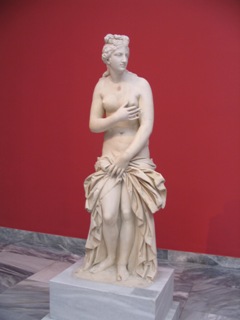
Aphrodite, by Praxiteles
National Archaeological Museum, Athens |
Midterm
exam for HONS 1001
The exam will begin at 8:30 in your HONS 1001 classroom, and you will
have until 10:15 to complete it. After an intermission, we will meet
again for discussion of Greek art and architecture.

Greek Art and Architecture
Some of the most enduring influences of the ancient Greeks that continue
to influence us are their extraordinary achievements in the visual arts:
their painting (mostly lost), sculpture and architecture. No
understanding of this period is complete without some understanding of
those accomplishments; we will spend some time today studying them in
preparation for our visit to the Metropolitan Museum next Friday. It is
important to realize that these artistic accomplishments were not
separate from the rest of classical Greek culture: Socrates was a
stone-cutter by profession, and the Parthenon was commissioned by
Pericles, and served as the treasury of the Delian League. Some vocabulary which you may find helpful in speaking about
this art: geometric style, cult object, votive offering, Kouros, Kore,
drapery, sarcophagus, equilibrium, contrapposto, relief sculpture, ideal
type, realism, individual facial figures, grave monument, Roman portrait
bust, decorative wall panel.
|
10/16
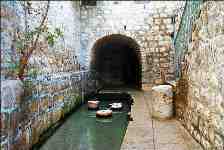
The Pool of Bethzatha

Pericles
Vatican Museums |
The Gospel of John
What should you do? Why should you do it? How do you know? How should
you behave toward others? What responsibility do you have toward them?
Why? How is what Jesus has to say similar to what we have seen before?
How is it different? How does what Jesus do reveal what he has to say?
What does that have to say about how your actions reveal who you are?
Before you come to class, write a few paragraphs
in your Journal with your first reflections on today's reading.
Read before class:
- The Gospel of John, 1, 3:16-21,
5:19-47 and 11:1-27

The Self and Community
The Athens of the Classical Age experienced a series of threats,
successes and defeats which raised questions of individual and social
responsibility in forms which are still compelling to us. Read their
accounts of the Persian War as background to their debates. Who am "I"
in all of this? Who am "I" in the face of death? What are "my"
responsibilities? How do the Athenian answers compare to those reflected
in the Katha Upanishad? How do they differ from the answers we saw in
Homer? in Pindar? in Sappho? How does your own sense of self differ from
any and all of these? How is it similar? Do you recognize in your
experience the kind of responsibility to the community that Pericles
appeals to? What do you conclude from your answer? What is your reaction
to Pericles' description of Athens? Does Pericles' description of
Athenian democracy coincide with the reality that Thucydides describes?
What lessons does Thucydides suggest in his descriptions of the
Mitylenean debate? In the Melian debate? In his description of the
Sicilian disaster?
Read before class:
- Heritage of
World Civilizations, pp. 101-118 (87-104 9th ed.)
- Herodotus,
On the Persian War (in Blackboard)
- Thucydides,
On the Peloponnesian War (in Blackboard)
|
10/18
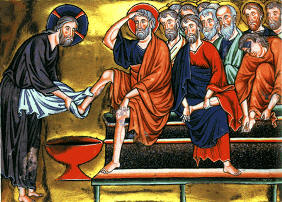
Jesus washing the disciples' feet
12th century French manuscript
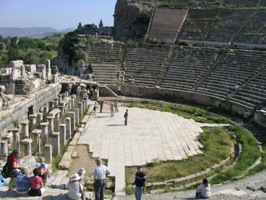
Theatre of Ephesus |
The Gospel of John
The long speech Jesus gives at this meal is an extended meditation on
what it means to be a follower of Jesus. How does Jesus' action at the
beginning of this story shape the meaning of what follows? How should
one act toward oneself? toward others? Why? How does Jesus speak of his
Father? How is that meant to be a model of how the follower should act?
What should you do?
Read before class:
- The Gospel of John, chapters
13-17, especially chapters 13 and 14

The Self and the Polis: Tragedy as katharsis
Aristotle says, in the Poetics, that "Tragedy is, then, a representation
of an action that is heroic and complete and of a certain magnitude--by
means of language enriched with all kinds of ornament, each used
separately in the different parts of the play: it represents men in
action and does not use narrative, and through pity and fear it effects
relief to these and similar emotions"(1449b). He uses the word
"katharsis" (translated here as "relief") to describe the ultimate
effect of tragedy. What is the "katharsis" (relief, purification,
clarification) in the plays of the Oresteia? What kind of knowledge
gives this "clarification"? How does this way of knowing differ from
"philosophical" knowing?
Read before class:
- Aeschylus,
Agamemnon, The Libation Bearers,
The Eumenides
|
10/19
Friday
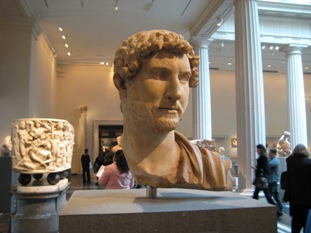 |
Trip to
the Metropolitan Museum of Art
We will spend Friday afternoon together on this trip to the Met. The bus
will leave from the WSOU side of the Recreation Center at 2:15 p.m. As
part of this experience, you will write a three-page description of one
of the myriad objects you encounter in this treasure house. We will be
assessing your ability to describe accurately and fully.
Begin your paper by identifying the object for
someone who has not seen it. Then give a detailed description of the
object, including the size, material, function of the object (if there
is one), the time period, the shape and ornamentation of the object.
Then go beyond the description of the image to a discussion of what it
means. Make a claim about the object you are describing in relation to
ideas or concepts you have learned about the culture which produced it;
formulate and argue a thesis about it. The paper should be three or four
pages in length; it is to be handed in by November 8.
Some vocabulary which you may find helpful: geometric style, cult
object, votive offering, Kouros, Kore, drapery, sarcophagus,
equilibrium, contrapposto, relief sculpture, ideal type, realism,
individual facial figures, grave monument, Roman portrait bust,
decorative wall panel.
We will spend some time together in the Greek and Roman sections of the
Metropolitan. Afterwards there will be ample time for you to explore
other parts of the Museum; there's virtually no end to this vast
collection. Wear comfortable shoes!
|
10/23
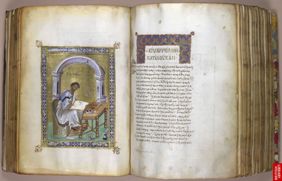
The Gospel of Luke 10th century MS
Constantinople
The British Library
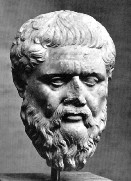
Plato |
The Gospel of Luke
The Gospel of Luke is one of the "synoptic" Gospels, so called because
they, seen together, contain much of the same material. The author
himself discusses his compositional technique in the opening verses.
What does he tell you about the origins of this text?
Luke is one of the two Gospels to tell stories of the birth of Jesus,
although his and Matthew's versions are very different from each other.
What does he mean to say about Jesus with his version of the story?
Who is this Jesus, as Luke depicts him in the stories he tells about his
activities? What does he want you to think about him? What message about
the present time is carried in the final chapter?
Read before class:
- Luke, 1-4; 6, 8, 11, 15, 22-24

The Self and the Polis: the question of justice:
politics as a moral enterprise
The Athenian experiment in democracy forced many to reconsider the role
of the individual in society. Plato's Socrates is one of the first
characters in literature to take seriously the motto of the Delphic
oracle to "know thyself." What does that Socrates have to say about
personal responsibility in the Euthyphro, Apology, and Crito? Is that
the same message we find in the early part of the Republic? How do these
understandings of the self compare to the emerging sense of the self
reflected in the Katha Upanishad?
As you read the Republic, think about the
following questions:
- How are we to take Socrates' suggestion that we
shift the discussion from the individual to the community
(368e-369b)? Is it simply a matter of seeing justice more clearly?
What else is at stake in this move?
- Why is Plato so concerned with education (paideia)
of the young (literature and gymnastic)? And why does he want to
exercise such strict control over the poets? (How might Euripides'
and Aristophanes' plays have fared in Plato's new polis?
- Correlate the great foundation myth (414d-415c) to the
class structure and the parts of the human soul. Does Plato get
these right? are any important things missing?
- What finally does Plato claim that justice is and how
does he arrive at this definition? Do you see problems with his
definition?
- Socrates claims that three waves must be endured in
order for this new polis to come into existence: the equal education
of men and women, the new kinship structure and the philosopher
ruler. What are the main lines of each proposal, and how are these
three connected?
- Plato's notion of the forms (ideas) plays the central
role in the education of the philosopher rulers with the highest
form being that of the good. What are the ways that Socrates
attempts to explain the form of the good (sun, divided line and
cave)? Do these make sense; do you see problems with any of these
analogies?
- Will the guardians be happy?
- What problems does Plato have with democracy? Are
his criticisms cogent? Do you see any relationship of his criticisms
with problems today?
- Why does Plato end his text with the story of Er? Do you
see any connection to the earlier story of the ring of Gyges? - - -
Does the story of Er fit at the end? What purposes, if any, does it
serve?
Read before class:
- Plato, Republic, Book 1-3
|
10/25
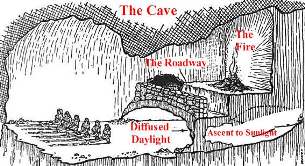
The Cave |
Plato's "Allegory
of the Cave" from the Republic
Unlike the Apology, which was probably written shortly after Socrates'
death, the Republic is a much later work,
and the "Socrates" here may or may not accurately represent the
historical Socrates; he is certainly the mouthpiece of Plato's own
thought. The Republic is a lengthy
discussion of the nature of justice (clearly a sore point for Plato, who
was present at Socrates' trial); the "Allegory of the Cave" is a
discussion of the nature of the kind of knowledge that will bring about
a just society.
Do you recognize the kind of thinking Plato is describing? Do you
recognize the "cave"? Do you live there? Do your friends? How do you
recognize what is real? How can you tell the real from the false? How
can you tell? What are you doing at university? How do you connect your
education with your future? Does that education imply obligations to
others? What might they be? What should you do? Why? How?
Before you come to class, write a few
paragraphs in your Journal with your first reflections on today's
reading.
Read before class:
- Plato,
Republic, Books 4-7
- You may enjoy
this version
of the Allegory of the Cave.
Midterm exam for
CORE 1101 (hand in take-home exam)
NOTE: This assignment must be handed in no later than class on November
1!
The exam will consist of your five-page essay answer to this question:
Nostra Aetate poses a number of basic human
questions about the meaning of life. Choose two of the readings we have
done and analyze how they address one of these questions.

Plato's Republic
Read before class:
- Plato,
Republic, Books 8-10
Second essay due in paper form.
|
10/30

PATH station flooding |
Hurricane Sandy - University closed for storm |
11/1
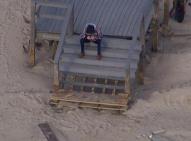
What's left of the Belmar boardwalk |
University closed for storm |
11/6
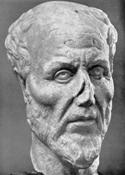
Plotinus
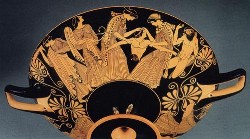
The Death of Pentheus |
Plotinus:
Tractate on the Beautiful (Peri tou Kalou)
Plotinus synthesized the fusion of Stoic and Platonic thought that was
the preoccupation of the Alexandrian philosophers of his time. His
development of the ideal of the Beautiful and the One in a neoplatonic
"monotheism" is both the culmination of ancient Greco-Roman philosophy
and the bridge to the philosophical treatment of the idea of God which
develops in Christian thought. At the same time, he also appears to
reflect the influence of the Indian philosophers in the Alexandria of
his time; notice the echoes of Buddhist teaching in the Tractate,
particularly in the way in which he effectively denies intrinsic (or
absolute) existence to the things of our experience.
Is Plotinus consistent with Plato in his understanding of knowledge?
How does Plotinus argue to the existence of a transcendent Beauty? Is
his argument similar to Diotima's?
Is that Beauty the same as the Christian God?
What is the purpose of human existence in a Plotinian world?
How does Plotinus' philosophical approach reflect the social and
political world of the third-century Empire?
Do you recognize Plotinus' footprints in Christianity today? In Islam?
Read before class:
- Reread Socrates' speech in Plato's
Symposium; in some ways, Plotinus is
commenting on this text in the Sixth Tractate.
- The
Tractate
on the Beautiful (annotated version)
- For more of Plotinus' work, you
can follow this link:
Plotinus, First Ennead (Scroll down to find
the sixth tractate; if that link does not go all the way to the
sixth tractate, click on the text-only link at the top of the page.
That version gives you the entire Ennead.)

The Self and the Polis: Tragedy and Comedy as social katharsis
The Greeks found in their dramas a way of coming to understand a number
of conflicts that remained unresolved at the very core of their
civilization; the plays they continued to demand give us insight into
the nature of these conflicts. Indeed, some of these conflicts can be
seen in our own world; perhaps they are inherent in human civilization.
In any event, audiences to this day continue to find understanding in
these plays. What is the "katharsis" (relief, purification,
clarification) in Antigone, in Bacchae? What conflicts do they
dramatize, and how do they illuminate them? What kind of knowledge gives
this "clarification"? How does this way of knowing differ from
"philosophical" knowing? How do these plays enrich the discussion of
Justice? How do they illuminate the conflicts which gave rise to Justice
as a problem?
The comic stage was another format in which the tensions in classical
Greek society became visible (and risible). It was not an accident that
a standard dramatic performance concluded with a comedy. Why are these
plays still hilarious? What do they tell us about our society? What do
they tell us about the Greeks? How does Euripides' treatment of women
differ from Aristophanes'? Why? How are they similar?
Read before class:
- Sophocles, Antigone
- Euripides, Bacchae (in Blackboard)
- Euripides, Medea (in Blackboard)
- Aristophanes,
Lysistrata
- Aristophanes,
The Clouds
Midterm exam for the Journey course due
at class today.
|
11/8
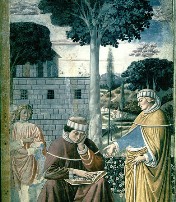
"Take, read"
Benozzo Gozzoli, 1465
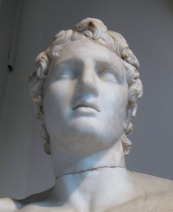
Alexander
National Archaeological Museum, Istanbul
|
Augustine's
Confessions
The Confessions is the first autobiography in Western history, and it
remains a classic of psychological introspection. Augustine is a writer
of unparalleled skill; pay especially close attention to the beginning
and the ending of each book, for they summarize his thoughts.
How does Augustine understand the meaning of human life? How does he
know this? Who is his partner in the dialogue in this work? In what way
is this familiar to you? In what way is it different from texts we have
seen before? What difference does it make in your understanding of the
text?
What do you take away from his description of his childhood? Does it
resonate with your experience? How? What are the various meanings of
"confession" as Augustine uses this term to apply to this book?
Augustine writes this book as a long, extended conversation with God:
what importance and meanings can be attached to this form; how would it
have been different without this dialogical character? What kind of
education did he receive, and what did he think of it?
Before you come to class, write a few paragraphs
in your Journal with your first reflections on today's reading.
Read before class:
- Augustine,
Confessions, Books 1 through 4

From Polis to Empire: Aristotle, Alexander and
Hellenism
With Alexander's unification of the eastern Mediterranean and western
Asia into a single cosmopolitan entity, the thought forms of classical
Greek thought became the common language of a wide variety of human
societies. The resulting synthesis of Greek, Egyptian and Middle Eastern
thought became the basis both of Roman imperial civilization and of the
Christian church. We are still the heirs of Alexander.
Read before class:
Deadline for handing in your paper on
an object from the Metropolitan Museum.
|
11/13
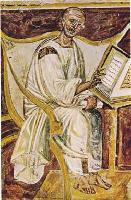
Augustine
Lateran Basilica, 6th century
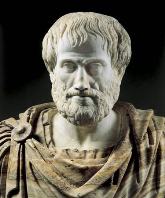
Aristotle, marble portrait bust, Roman copy (2nd century) of a
Greek original (c. 325 B.C.E.) in the Museo Nazionale Romano, Rome |
Augustine's
Confessions
What does Augustine mean by the "disintegrated self"? How is this
similar to, or different from, Plato's view of the self? the view of the
self in John? in the Gita? in Buddhist thought? Why is he so troubled by
the pear-stealing episode? Why is he still brooding over it late in his
life? What does he learn from it? What do you make of it? How does his
reflection on this episode color his understanding of human action? What
should you do?
How does Augustine interpret his boyhood prank in Bk. II and what
significance does he attach to it? For about ten years, he was
associated with a religious group called the Manichees; who are they,
what do they believe and of what importance is this to Augustine? As a
young adult, Augustine is perplexed by a number of philosophical issues:
what are they and how does he attempt to resolve them? Of what
importance are love and sex to him during these early years?
Why does he go to Rome and then to Milan? What ambitions does he have"
What is happening in the western Roman Empire at this point? What
influence does Ambrose have on him?
Book VII describes Augustine's "intellectual" conversion; pay attention
to the importance of "platonist" philosophy and how he sees this in
relation to Christian revelation. What are the main features of this
aspect of his conversion? How does Plotinus shape Augustine's answers?
Read before class:
- Augustine,
Confessions, Books 5 through 7
Before you come to class, write a few paragraphs
in your Journal with your first reflections on today's reading.

From Polis to Empire: Aristotle
The ethical and political thought of Aristotle poses a startling
contrast to that of Plato, whom Aristotle at one point summarily
rejects. Aristotle posits an entirely different set of standards for
evaluating human individual and social conduct; the debate between these
two radically different points of view define the parameters of Western
ethical and political thinking to this day.
How does Aristotle pose the question of "good" actions? Why should one
act in this way? What is the purpose of human activity, from his
perspective? What is the purpose of human society? How does Aristotle's
notion of happiness differ from our contemporary understandings of it?
Read before class:
- Aristotle's
Nicomachean Ethics
Bk I, 1-2, 4, 7;
Bk II, 1, 6;
Bk X, 7-8
- Aristotle,
Politics Bk I, 1-2;
Bk III, 6-7, 9;
Bk IV, 11;
Bk V, 8;
Bk
VI, 5
Fourth essay topic (due December 6):
This will be your fourth paper in which you argue a thesis based on a
critical reading of one of the following texts. Pay attention in
your writing to the language choices in the text. Like the previous
papers, it is to be about three pages in length, and you are encouraged
to critique each other's writing before submitting this paper.
-
Plato, Republic.
The Myth of Er (Bk X, 620a-d)
-
Aeschylus,
Agamemnon, Clytemnestra's speech: lines 1391-1415
-
Vergil, Aeneid,
Book II, lines 635-662
|
11/15
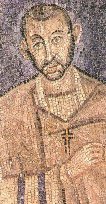
Ambrose of Milan, 5th century mosaic,
probably a portrait Sant' Ambrogio, Milan
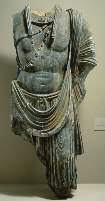
Torso of a boddhisattva, Gandhara, Pakistan, 1st-2nd century
C.E. The Metropolitan Museum of Art. Note the Greek
influence on the form of the body, showing the degree to which western
and southern Asia were part of a world stretching to Spain and Britain. |
Augustine's
Confessions
How does Augustine work his way through the question of evil? How does
this question go back to the pear tree episode? Do you find his analysis
of the question persuasive? Why? How? Does he really answer the question
he sets himself? Do you see his alternatives still present in our world
today? How does one find the transcendent? How does one imagine it? What
does it mean to suffer?
What do you make of Augustine's final conversion? What made it
difficult? What made it possible? How did his intellectual struggles
pave the way for it? How does one come to a vision of life? How does one
understand the meaning of beauty? of truth? How does your own spiritual
journey reflect Augustine's? How does one construct community?
Book VIII culminates in Augustine's moral conversion: what are its main
features; with what (in himself) is he struggling; how does his
conversion finally come about? What is the "vision of Ostia" as
Augustine recounts it in Book IX? Throughout the book, what does
Augustine consider the problem to be? How does he conclude it can
be dealt with?
Before you come to class, write a few paragraphs
in your Journal with your first reflections on today's reading.
Read before class:
- Augustine,
Confessions, Books 8 through 10

From Polis to Empire: Philosophical thought in the
developing empires
With Alexander's unification of the eastern Mediterranean and western
Asia into a single cosmopolitan entity, the thought forms of classical
Greek thought became the common language of a wide variety of human
societies. The resulting synthesis of Greek, Egyptian and Middle Eastern
thought became the basis both of Roman imperial civilization and of the
Christian church. We are still the heirs of Alexander. We will begin
with more consideration of Aristotle's Politics.
Read before class:
|
11/20
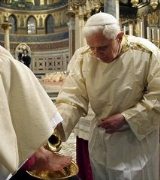
Pope Benedict XVI washing feet on Holy Thursday in
the Lateran basilica
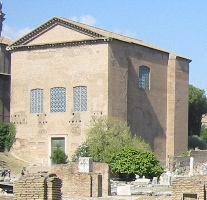
The Curia Iulia, seat of the Roman Senate, in the Roman Forum |
Pope Benedict XVI's
Encyclical "God is Love"
Papal encyclical letters are a form of public teaching; usually they are
devoted to an examination of a particular question. It is significant
that Pope Benedict XVI chose this topic as the subject of his first
formal letter.
As you read the letter, do you find his arguments persuasive? Does his
analysis resonate with your own experience? How? Why? What do you find
surprising in it? What is not surprising? Given our discussions this
semester, does his analysis clarify some of the issues we have been
discussing? Does love of God necessarily translate into love of others?
Individually? Communally? Why? How? How does his understanding of God
ground his vision of human community? How does it suggest a grounding
for one's own self-understanding?
Before you come to class, write a few paragraphs
in your Journal with your first reflections on today's reading.
Read before class:
- Pope Benedict XVI's Encyclical
God is Love, Part I

From Polis to Empire: The Roman Republic
Livy on the Roman concept of female virtue, Polybius on the constitution
of the Republic.
Read before class:
- Heritage of
World Civilizations, pp. 182-193 (175-185 9th ed.)
- Livy selections (in Blackboard
- Polybius selections (in
Blackboard)
For a computer-designed view of ancient
Rome, go to earth.google.com and download the software to visit
Constantine's Rome.
|
| 11/22 |
Thanksgiving Recess -
University Closed |
11/27
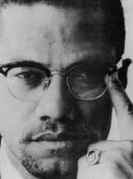
Malcolm X
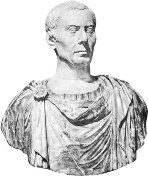
Julius Caesar |
The Autobiography
of Malcolm X
Malcolm X's Autobiography recounts his transformative journey into the
leader he became. He raises questions of the meaning of the American
experience that continue to challenge us. How does one find meaning in
oppression? in suffering? What makes for a truly human community? How
does one's vision of the transcendent affect the kind of community one
builds? How do our cultural values get in the way of genuine community?
How do we get past the cultural presuppositions that prevent the
formation of genuine human community? As you read, think about the power
of people's attitudes on Malcolm's personal growth and development. What
kind of person did he become as a consequence of those attitudes, his
own and others'?
Read before class:
- Malcolm X,
The Autobiography of Malcolm X, chapters 1 through 9
Before you come to class, write a few paragraphs
in your Journal with your reflections on today's reading.

From Polis to Empire: Julius Caesar and the fall of
the Roman Republic
Julius Caesar was one in a series of warlords whose private armies
continually threatened the stability of the Roman Republic, which was
itself collapsing under the weight of administering what had suddenly
become a great world empire with institutions developed to rule a
modest-size city.
Read before class:
- Catullus,
Poems (in Blackboard)
- Vergil, The
Fourth Eclogue (in Blackboard)
- Vergil,
Aeneid, Book 1
- Heritage of
World Civilizations, pp. 193-198 (185-189 9th ed)
|
11/29
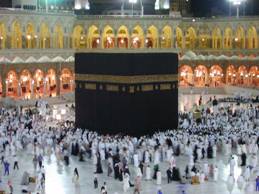
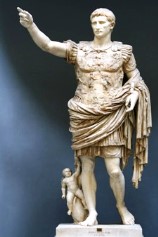
Augustus Caesar (the "Augustus Prima Porta")
Vatican Museums |
The Autobiography
of Malcolm X
Malcolm X also raises the question of structural oppression. Is it
enough to be a good person as an individual? Do our responsibilities go
beyond personal goodness? Is it enough to pursue personal happiness? How
can we appreciate the humanness of others who are different from us? How
can we find common ground with them? What makes this appreciation
difficult? How? How does Malcolm X find a grounding for this
appreciation in Muslim values? How do those values appear to you? How
did his experience at Mecca change him?
Before you come to class, write a few paragraphs
in your Journal with your reflections on today's reading.
Read before class:
- Malcolm X,
The Autobiography of Malcolm X, chapters 10 through 19

From Polis to Empire: Rome as Republic and as
Empire: Vergil and the Aeneid
Vergil's Aeneas is both an epic hero on the model of Achilles and
Odysseus, and a type of the model Roman, invented to justify the new
imperial despotism of Augustus Caesar. The tensions between Vergil's
epic aspirations and the political nature of his commission made his
work an enduring classic. Vergil's other poetry also articulates an
idealized version of what it meant to be "Roman."
The Odes of Horace are another perennial monument of the Augustan
project. Like Vergil, he was patronized by Maecenas, an extremely
wealthy Roman who was an adviser to Augustus. Published in 23 B.C.E.,
they give a rounded picture of the Rome that was settling in to rule the
world. The first six Odes of Book III, the "Roman Odes," portray the
social, moral, political and religious aims of the new Roman Empire as
Augustus would have them accepted. What does it now mean to be a
"Roman"?
Be prepared to discuss:
1. The driving force of the Aeneid: a divine plan?
2. The intervention of the gods, especially in Books 1 and 7.
Read before class:
- Heritage of
World Civilizations, pp. 198-207 (189-198 9th ed.)
- The
Essential Aeneid, Books 2, 4, 6, 7, 8, 12
- Horace, Odes
(in Blackboard)
|
12/4
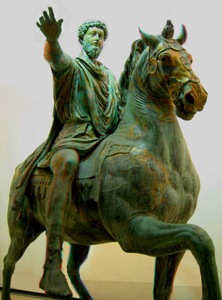
Marcus Aurelius
Musei Capitolini, Rome |
Course Summary
Final Exam (take-home; due via email by midnight of
December 16)
Your final for the Journey of Transformation class
consists of two questions focusing on the two autobiographies that we
have read. You are to answer both of them.
1. Write an analytical essay in which you argue a thesis concerning the
autobiographies that we have read in the second half of the semester.
You are to determine the topic of the thesis and argue it on the basis
of the two texts. Below are some questions to consider that are designed
to help you develop a thesis and argument. You do not necessarily need
to answer all, or any, of these questions, but they are a place to start
as you contemplate your topic. Avoid merely giving plot summaries! We
are looking for your analytical and critical thinking skills to shine in
these essays. The final essay should be no longer than three to four
pages. (30 points)
Questions to consider for your analysis:
Are there common elements that run through these stories of
transformation? If so, what are they?What are the effects of these
transformations in the lives of the subject?In what significant ways do
these life stories differ?What difference does it make that these are
autobiographies rather than some other genre?How do particular themes
that we studied earlier in the semester affect your reading and
understanding of these texts?
2. Identify one autobiography that has challenged or changed your
thinking in what you consider to be a positive direction. How and why
was it challenging? Be specific with respect to the text and its effects
on your perspective. Your response should be no more than two pages
long. (20 points)

From Polis to Empire: The Stoics
The first century CE brought a renewed interest in philosophy, but with
a decidedly different approach. Rather than pondering ideal forms, or
causes, the "moral" or "practical" philosophers were concerned with the
question, "How should I live?" How do the Stoics? the Epicureans? Do you
recognize some of these answers in the world we live in? Who are the
Epictetuses of our contemporary culture?
Read before class:
Come to class prepared to formulate the
list of topics, persons, ideas and things for the final examination. We
will formulate the questions for the exam in the next class.
|
12/6
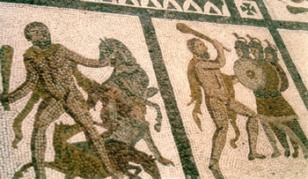
The Labors of Hercules
3rd century Roman mosaic
Madrid Archeological Museum |
Course Summary

Review for final exam
We will formulate the questions for the final examination in this class,
as well as tie together sundry other loose ends. The examination will,
of course, be cumulative.
Fourth essay due. Also last day to hand in
cultural event reviews. |
12/12
10:10 a.m. - 12:10 p.m.
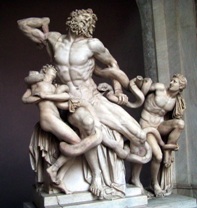
Laocoon
Vatican Museums |
Final
Exam for the Colloquium
The final exam will be in two parts.
In the first part, we will provide a list of ten items from the
identification list posted in Blackboard. You will identify five
of these items, in a paragraph for each. (50%)
In the second part, you will answer one of these questions in a
comprehensive essay, citing appropriate textual basis for your
arguments, chosen from at least two texts we have read this semester.
(50%)
1. In many of the texts which we have read, men and women differ on the
question of what is right. Analyze two of the texts we have read
to explain how and why their answers to this questions differ.
2. Discuss the concept of duty in two of the texts we have read.
How does that conception inform characters' actuions and behaviors?
3. What should one strive for in life? Analyze two texts' proposed
answers to the question. |
